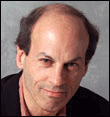
There he was earlier this month at Stanford University to help christen the Computational Earth and Environmental Science research center that Sun donated equipment too.
Old times because Stanford was where it all started for McNealy, and “employee #1” Andy Bechtolsheim, who was also on hand. Bechtolsheim designed the company’s first workstation using the Stanford University Network (SUN) while both were students there.
“I always wonder how a Stanford golf major is allowed to speak at these things,” McNealy quipped. Actually, McNealy got his MBA there, but the former CEO never passes up the opportunity for a good line.
By his presence at Stanford, and globe-trotting to other Sun customer events, (last week he was in Washington D.C. in his role as chairman of Sun’s Federal computer effort and also in Toronto at a High Performance Computing installation) it’s clear McNealy isn’t slowing down or speaking any less forthrightly.
Ever the salesmen, he didn’t miss a chance to knock the competition while touting the Sun alternative.
“We need to move to thin clients,” said McNealy. “A Sun Ray [thin client] uses four watts and lets employees work at home.”
He said more than half of Sun’s employees use Sun Rays and that they’re a better, more effective computer resource than “the 230 Watt Wintel space heaters.”
Which is not to say McNealy and Sun aren’t still enamored with big iron (the very systems that power thin clients, among other devices).
“We think big problems will get solved with supercomputers,” he said.
McNealy, went on to tout the SunGrid utility computing effort which has “400 to 500 applications” running following its release a few months ago.
Ironically, the company founded on “The network is the computer” slogan didn’t own the network.com Web address where computer time on Sun’s public grid can be purchased. StorageTek owned it, which proved to be a nice bonus surprise when Sun made the controversial purchase of the giant tape drive company last year.
Switching from commercial concerns to the state of education, McNealy spoke just as passionately.
“At Sun our mission is to eliminate the digital divide without torching the planet,” he said, referring to the energy savings and efficiency of the utility model.
Sun founded the Global Education and Learning Community (GELC) with a goal of making educational resources more affordable through online access.
“Why should students pay $130 for a math book when nothing much has changed since Newton got hit over the head with an Apple?” asked McNealy.
He suggested math and other basic K-12 textbooks should be open sourced and available to all. Part of GELC’s mission is to leverage the experience Sun’s gained in the Java Community Process to make education texts more accessible.
Taking the open source idea further, he threw out this tantalizing thought: “Wouldn’t it be great to open source drug development?”
No doubt about it, the guy has some great lines (and a great speechwriter, who I briefly interviewed), but with Jonathan Schwartz now leading the charge at Sun, does it matter?
Yes, Pund-IT analyst Charles King told internetnews.com.
“Sun may have hit an iceberg and taken on water, but he’s still the right captain to tell those loyal customers, ‘We’ll get you back to port.'”
King notes Sun’s core Unix server business has had severe losses over the past several years “but still makes billions of dollars selling those systems to company’s that have huge investments in Sun.
“When McNealy gets on the soap box those are the people he’s talking to.”
John Barry co-authored Sunburst: The Ascent of Sun Microsystems, a book that detailed Sun’s early go-go years in the late 1980s. Unfortunately for Barry, the book came out in 1989, when Sun hit the first serious wall in its growth, a pattern repeated following its meteoric growth in the dot-com era.
“I saw [McNealy] recently at an event, and he still comes off as a brash frat boy,” said Barry. “The industry has matured a lot, but I’m sure he’s still popular with the Sun faithful.”
Barry said Sun today is less in need of a brash leader than a fix to its operational problems.
But McNealy clearly still has a role in the company he helped build. I’m guessing he will continue to be outspoken and adhere to the one-liner quote attributed to him in the book jacket of Sunburst: “To ask permission, is to seek denial.”


